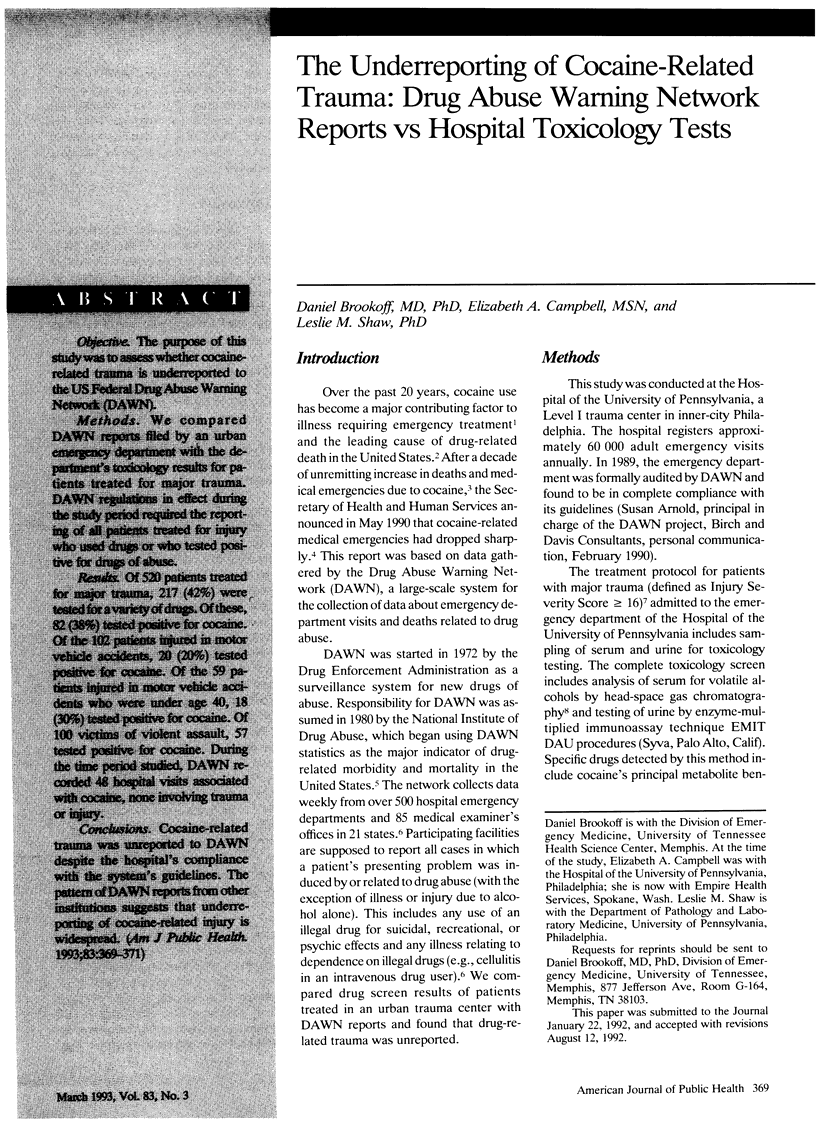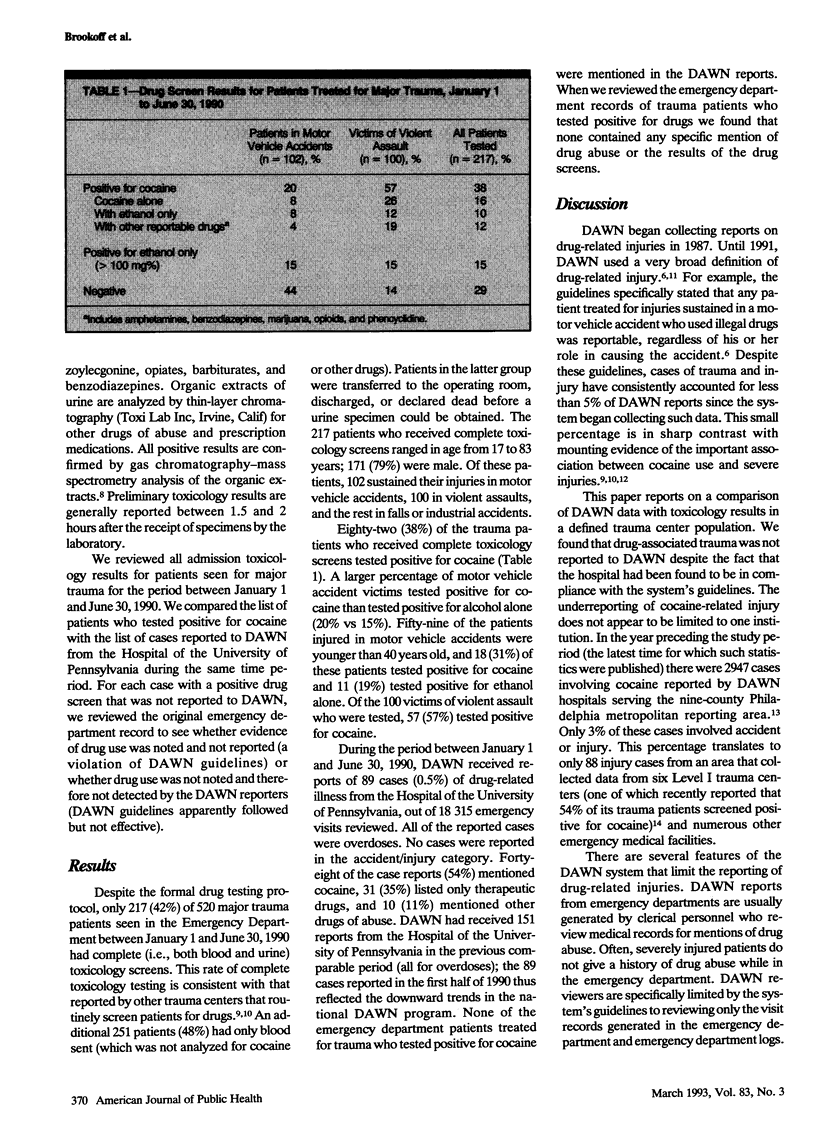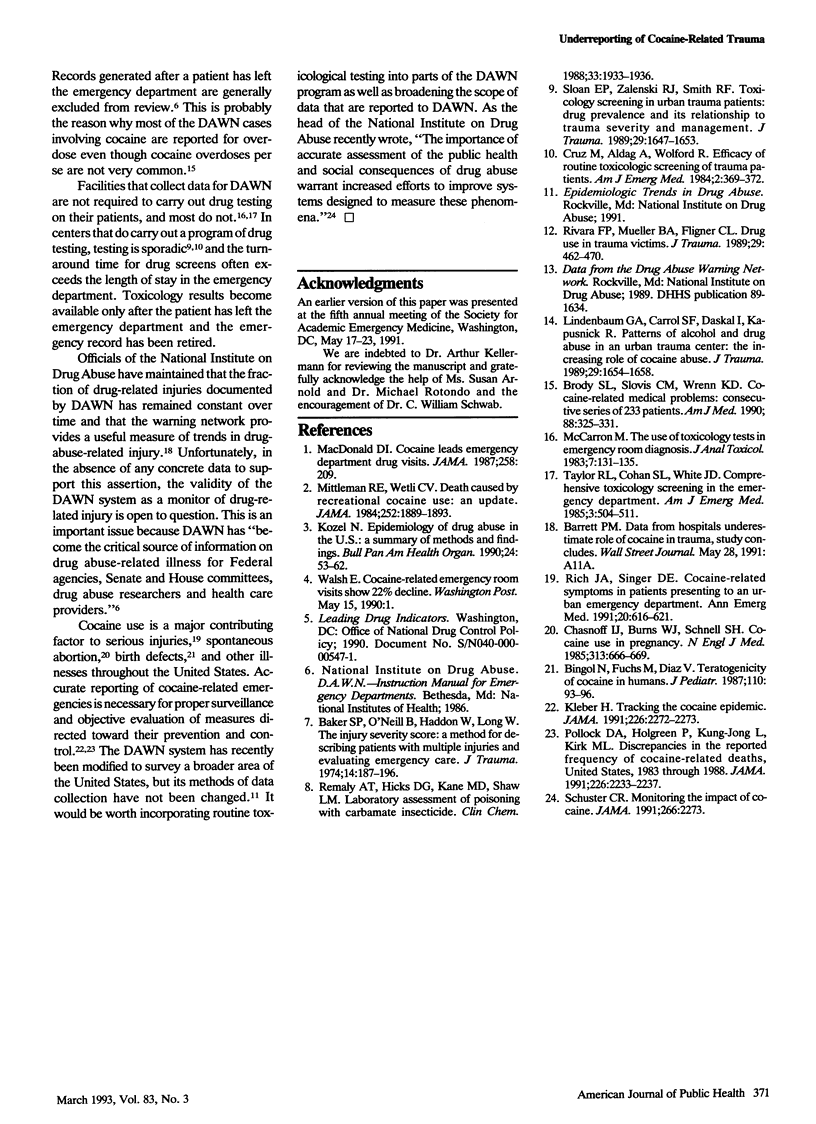Abstract
OBJECTIVE. The purpose of this study was to assess whether cocaine-related trauma is underreported to the US Federal Drug Abuse Warning Network (DAWN). METHODS. We compared DAWN reports filed by an urban emergency department with the department's toxicology results for patients treated for major trauma. DAWN regulations in effect during the study period required the reporting of all patients treated for injury who used drugs or who tested positive for drugs of abuse. RESULTS. Of 520 patients treated for major trauma, 217 (42%) were tested for a variety of drugs. Of these, 82 (38%) tested positive for cocaine. Of the 102 patients injured in motor vehicle accidents, 20 (20%) tested positive for cocaine. Of the 59 patients injured in motor vehicle accidents who were under age 40, 18 (30%) tested positive for cocaine. Of 100 victims of violent assault, 57 tested positive for cocaine. During the time period studied, DAWN recorded 48 hospital visits associated with cocaine, none involving trauma or injury. CONCLUSIONS. Cocaine-related trauma was unreported to DAWN despite the hospital's compliance with the system's guidelines. The pattern of DAWN reports from other institutions suggests that underreporting of cocaine-related injury is widespread.
Full text
PDF


Selected References
These references are in PubMed. This may not be the complete list of references from this article.
- Baker S. P., O'Neill B., Haddon W., Jr, Long W. B. The injury severity score: a method for describing patients with multiple injuries and evaluating emergency care. J Trauma. 1974 Mar;14(3):187–196. [PubMed] [Google Scholar]
- Bingol N., Fuchs M., Diaz V., Stone R. K., Gromisch D. S. Teratogenicity of cocaine in humans. J Pediatr. 1987 Jan;110(1):93–96. doi: 10.1016/s0022-3476(87)80297-4. [DOI] [PubMed] [Google Scholar]
- Brody S. L., Slovis C. M., Wrenn K. D. Cocaine-related medical problems: consecutive series of 233 patients. Am J Med. 1990 Apr;88(4):325–331. doi: 10.1016/0002-9343(90)90484-u. [DOI] [PubMed] [Google Scholar]
- Chasnoff I. J., Burns W. J., Schnoll S. H., Burns K. A. Cocaine use in pregnancy. N Engl J Med. 1985 Sep 12;313(11):666–669. doi: 10.1056/NEJM198509123131105. [DOI] [PubMed] [Google Scholar]
- Cohan S. L. Toxicological analysis in the emergency patient. Am J Emerg Med. 1984 Jul;2(4):369–369. doi: 10.1016/0735-6757(84)90174-8. [DOI] [PubMed] [Google Scholar]
- Kleber H. D. Tracking the cocaine epidemic. The Drug Abuse Warning Network. JAMA. 1991 Oct 23;266(16):2272–2273. [PubMed] [Google Scholar]
- Kozel N. J. Epidemiology of drug abuse in the United States: a summary of methods and findings. Bull Pan Am Health Organ. 1990;24(1):53–62. [PubMed] [Google Scholar]
- Lindenbaum G. A., Carroll S. F., Daskal I., Kapusnick R. Patterns of alcohol and drug abuse in an urban trauma center: the increasing role of cocaine abuse. J Trauma. 1989 Dec;29(12):1654–1658. doi: 10.1097/00005373-198912000-00012. [DOI] [PubMed] [Google Scholar]
- McCarron M. M. The use of toxicology tests in emergency room diagnosis. J Anal Toxicol. 1983 May-Jun;7(3):131–135. doi: 10.1093/jat/7.3.131. [DOI] [PubMed] [Google Scholar]
- Mittleman R. E., Wetli C. V. Death caused by recreational cocaine use. An update. JAMA. 1984 Oct 12;252(14):1889–1893. [PubMed] [Google Scholar]
- Pollock D. A., Holmgreen P., Lui K. J., Kirk M. L. Discrepancies in the reported frequency of cocaine-related deaths, United States, 1983 through 1988. JAMA. 1991 Oct 23;266(16):2233–2237. [PubMed] [Google Scholar]
- Remaley A. T., Hicks D. G., Kane M. D., Shaw L. M. Laboratory assessment of poisoning with a carbamate insecticide. Clin Chem. 1988 Sep;34(9):1933–1936. [PubMed] [Google Scholar]
- Rich J. A., Singer D. E. Cocaine-related symptoms in patients presenting to an urban emergency department. Ann Emerg Med. 1991 Jun;20(6):616–621. doi: 10.1016/s0196-0644(05)82378-9. [DOI] [PubMed] [Google Scholar]
- Rivara F. P., Mueller B. A., Fligner C. L., Luna G., Raisys V. A., Copass M., Reay D. T. Drug use in trauma victims. J Trauma. 1989 Apr;29(4):462–470. doi: 10.1097/00005373-198904000-00008. [DOI] [PubMed] [Google Scholar]
- Schuster C. R. Monitoring the impact of cocaine. JAMA. 1991 Oct 23;266(16):2273–2273. [PubMed] [Google Scholar]
- Sloan E. P., Zalenski R. J., Smith R. F., Sheaff C. M., Chen E. H., Keys N. I., Crescenzo M., Barrett J. A., Berman E. Toxicology screening in urban trauma patients: drug prevalence and its relationship to trauma severity and management. J Trauma. 1989 Dec;29(12):1647–1653. [PubMed] [Google Scholar]
- Taylor R. L., Cohan S. L., White J. D. Comprehensive toxicology screening in the emergency department: an aid to clinical diagnosis. Am J Emerg Med. 1985 Nov;3(6):507–511. doi: 10.1016/0735-6757(85)90161-5. [DOI] [PubMed] [Google Scholar]


